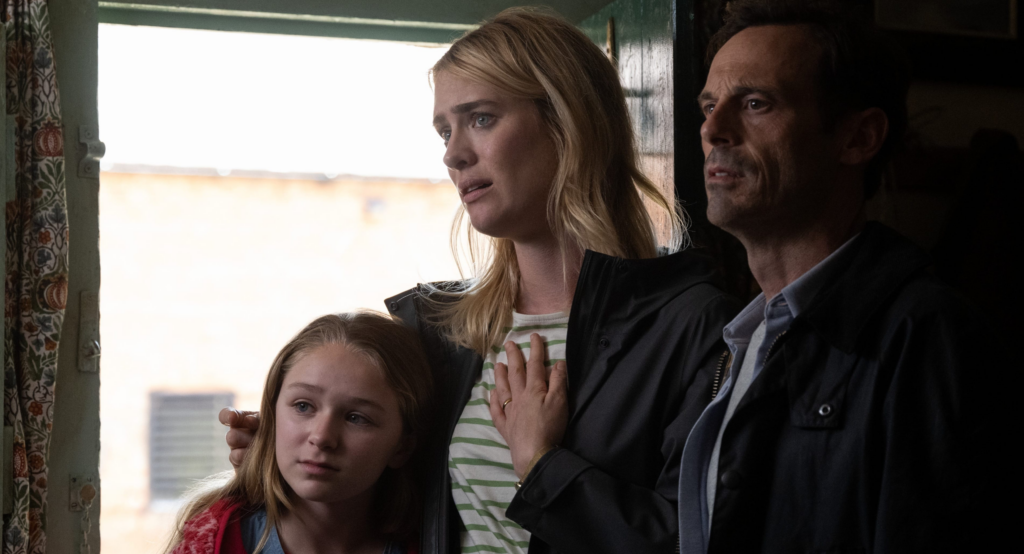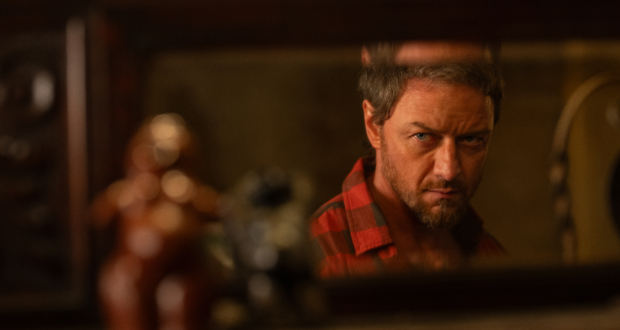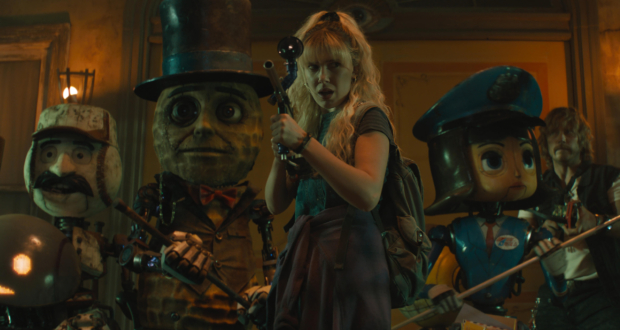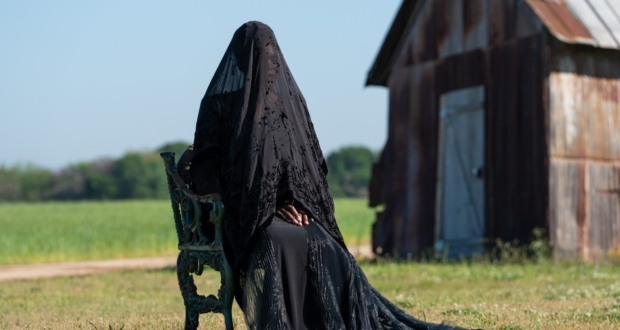James Watkins’ Speak No Evil, a remake of the 2022 Danish film of the same name, offers a chilling exploration of human behavior under extreme psychological duress. With a stellar cast led by James McAvoy, Mackenzie Davis, and Aisling Franciosi, the film navigates the murky waters of trust, manipulation, and the dark underbelly of seemingly perfect social interactions.
Speak No Evil revolves around Paddy (James McAvoy) and Louise Dalton (Mackenzie Davis), a couple looking to escape the monotony of their lives with a vacation in a picturesque country house. They are joined by Ciara (Aisling Franciosi), a woman whose enigmatic presence immediately sets the tone for the unsettling events to follow. The trio’s peaceful getaway quickly unravels as their interactions with the locals and each other take on increasingly disturbing undertones.
The film’s premise—a dream holiday turned psychological nightmare—is rooted in the universal fear of the unknown, of being trapped in a situation where the familiar becomes foreign and threatening. Watkins effectively taps into these anxieties, crafting a narrative that keeps the audience on edge, wondering when the next shoe will drop.
Performances:
James McAvoy delivers a nuanced performance as Paddy, a man whose affable exterior hides a deep well of insecurity. McAvoy excels at portraying the slow unraveling of Paddy’s composure, as his character is drawn into a psychological game that he is ill-equipped to handle. Mackenzie Davis is equally compelling as Louise, whose initial optimism and enthusiasm for the trip gradually give way to a palpable sense of dread. Davis brings a vulnerability to her role that makes Louise’s descent into fear all the more affecting.
Aisling Franciosi’s portrayal of Ciara is perhaps the most intriguing. Her character is a catalyst for much of the tension in the film, and Franciosi strikes a perfect balance between charm and menace. Ciara’s motivations are kept deliberately ambiguous, adding to the film’s overall sense of unease. The supporting cast, including Scoot McNairy and Dan Hough, provide solid performances that complement the leads, though their characters are somewhat underdeveloped.
Direction and pacing:
Watkins’ direction shines in the way he builds and maintains tension throughout the film. The idyllic setting of the country house, with its lush landscapes and serene atmosphere, serves as a stark contrast to the psychological turmoil experienced by the characters. This juxtaposition is masterfully handled, as the beauty of the surroundings only heightens the sense of dread that permeates the film.
The pacing of Speak No Evil is deliberately slow, allowing the tension to simmer just below the surface before boiling over in key moments. Watkins uses silence and subtle sound design to great effect, creating an atmosphere where even the smallest noise or gesture takes on ominous significance. This approach is reminiscent of other psychological thrillers, but Watkins manages to keep it fresh by focusing on the interpersonal dynamics between the characters.
Flaws:
Despite its strengths, Speak No Evil falters in its final act, where the tension that has been so carefully constructed begins to unravel. The film’s climax, while intense, feels rushed and somewhat contrived, as if the story is being forced to fit into a specific mold rather than allowing it to unfold organically. The ambiguity that worked so well earlier in the film becomes frustrating as the narrative begins to meander, leaving key questions unanswered and certain plot points feeling unresolved.
Moreover, the film’s reliance on certain tropes of the genre, such as the “twist” ending, feels predictable and detracts from the overall impact. While the ending is sure to spark debate among viewers, it ultimately lacks the emotional and psychological punch that the preceding acts promised.
Impressive score and camerawork:
 The film’s cinematography is another highlight. The camera work is intimate, often focusing on close-ups of the characters’ faces, emphasizing their emotional states. This creates a claustrophobic feeling that mirrors the characters’ psychological entrapment. The use of natural light and shadows further enhances the eerie atmosphere, particularly in scenes set during twilight or at night.
The film’s cinematography is another highlight. The camera work is intimate, often focusing on close-ups of the characters’ faces, emphasizing their emotional states. This creates a claustrophobic feeling that mirrors the characters’ psychological entrapment. The use of natural light and shadows further enhances the eerie atmosphere, particularly in scenes set during twilight or at night.
The score, composed by Danny Bensi and Saunder Jurriaans, is sparse but effective, relying on minimalist motifs that underscore the film’s unsettling mood. The music never overwhelms the action on screen, instead serving to heighten the tension at key moments. Kurzel’s score is complemented by the film’s sound design, which is equally restrained yet impactful. The sound of creaking floors, distant whispers, and other ambient noises contribute to the sense of unease without resorting to jump scares or overt horror techniques.
Themes:

L to R: Ant (Dan Hough) and Agnes Dalton (Alix West Lefler) in Speak No Evil, directed by James Watkins.
At its core, Speak No Evil is a film about power dynamics—both in interpersonal relationships and within the broader social context. The film explores how easily trust can be manipulated and how quickly civility can erode under pressure. Paddy and Louise’s interactions with Ciara and the other characters they encounter are marked by a constant push and pull for control, with each party attempting to assert dominance in subtle, often unspoken ways.
These themes are particularly resonant in today’s social climate, where the boundaries between public and private personas are increasingly blurred. Watkins uses the setting of the country house as a microcosm for these larger societal tensions, creating a narrative that is both specific to the characters’ experiences and universally relatable.
Overall:
Speak No Evil is a remake that excels in its portrayal of psychological tension and the darker aspects of human nature. With strong performances, particularly from McAvoy, Davis, and Franciosi, and an atmosphere that is both beautiful and terrifying, the film offers a compelling viewing experience. However, its narrative missteps in the final act prevent it from being a truly great thriller.
Speak No Evil Review: Blumhouse Is Finally Back To Greatness
-
Acting - 8.5/10
8.5/10
-
Cinematography/Visual Effects - 8/10
8/10
-
Plot/Screenplay - 7/10
7/10
-
Setting/Theme - 7.5/10
7.5/10
-
Watchability - 8/10
8/10
-
Rewatchability - 6/10
6/10
Overall
User Review
( votes)Summary
Speak No Evil, directed by James Watkins, is a psychological thriller that delves into the sinister side of human behavior. Led by powerful performances from James McAvoy, Mackenzie Davis, and Aisling Franciosi, the film explores the breakdown of trust and the manipulation of social dynamics. While the movie excels in building tension, its rushed climax and predictable twist weaken the overall impact. Despite its flaws, Speak No Evil offers a gripping, unsettling narrative that lingers with the audience.
Pros
- Strong performances, particularly by James McAvoy and Aisling Franciosi.
- Masterful direction by James Watkins, building an atmosphere of psychological tension.
- Effective use of sound and minimalist score.
- Beautiful yet eerie cinematography that enhances the film’s unsettling tone.
- Relatable themes about trust and power dynamics.
Cons
- Final act feels rushed, with unresolved plot points.
- Predictable twist ending, which detracts from earlier suspense.
- Some underdeveloped supporting characters.

















